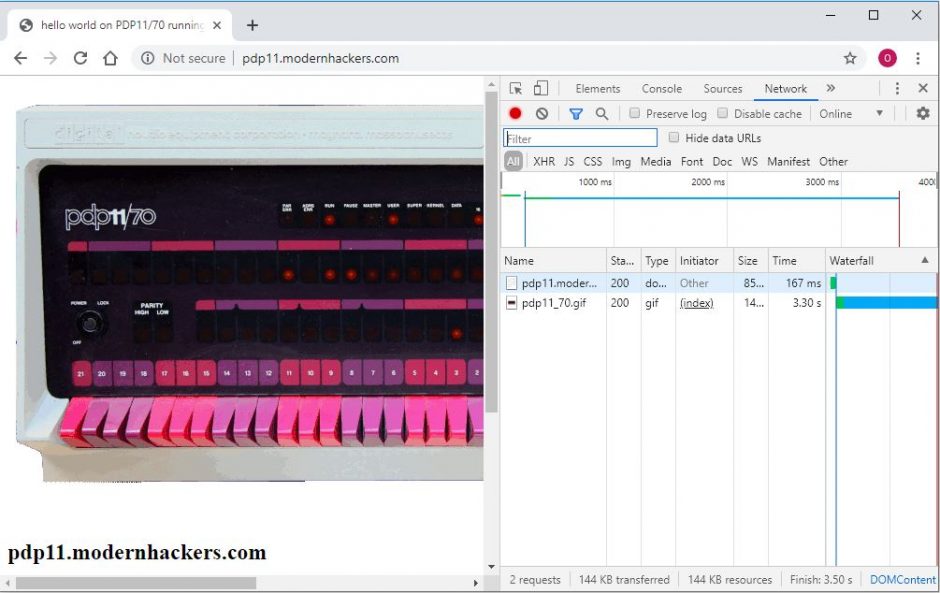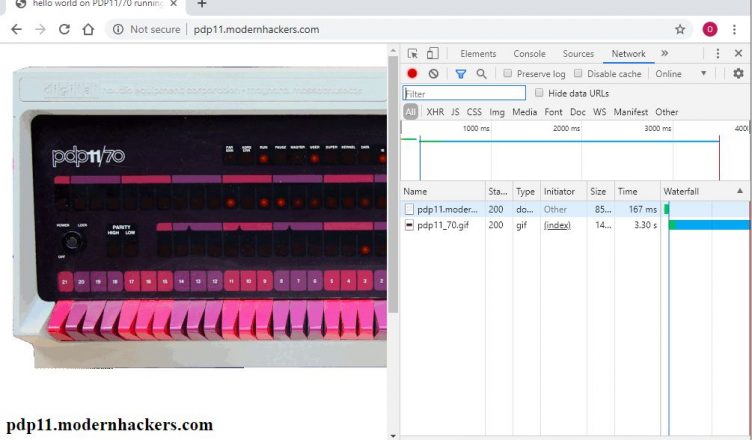PDP11 was the machine just in the beginning of Networking and the Internet Rush.
As a result a maintained and security patched BSD 2.11 running pretty well still on a PDP11 machine.
If you install this custom httpd, you will be able to serve basic web requests. This is a community driven web server with basic functionality as PDP11 originally did not have webserver capability under 2.11 BSD.

There is a community driver Web Server (HTTP) Server that created for PDP use:
https://github.com/AaronJackson/2.11BSDhttpd
/* 2.11BSD httpd */ #include < sys/types.h > #include < sys/file.h > #include#include < netinet/in.h > #include < arpa/inet.h > #include < sys/stat.h > #include < sys/wait.h > #include < sys/errno.h > #include < sys/time.h > #include < netdb.h > #include < signal.h > #include < stdio.h > #include < stdlib.h > #include < string.h > #include < unistd.h > #define CGI_BIN #define BUF_SIZE 256 #define PATH_LEN 512 #define WWW_ROOT "/var/www/www/" #define LOGFILE "/usr/adm/httpd.log" #define HTTP_200 "HTTP/1.1 200 OK" #define HTTP_403 "HTTP/1.1 403 Forbidden" #define HTTP_404 "HTTP/1.1 404 Not Found" #define HTTP_500 "HTTP/1.1 500 Internal Server Error" FILE *htlog; /* Get path information and handle errors */ void chk_path(path, st) char *path; struct stat *st; { /* stat the path. If there's an error, log it and terminate. */ if (stat(path, st) != 0) { if (errno & (ENOENT | ENOTDIR | EINVAL | ENAMETOOLONG)) { fprintf(htlog, "404 %s\n", strerror(errno)); printf("%s\r\n", HTTP_403); } else if (errno & EACCES) { fprintf(htlog, "403 %s\n", strerror(errno)); printf("%s\r\n", HTTP_403); } else { fprintf(htlog, "500 %s\n", strerror(errno)); printf("%s\r\n", HTTP_500); } fclose(htlog); exit(1); } } int main(argc, argv) int argc; char *argv[]; { char path[PATH_LEN]; struct stat st; struct itimerval timeout; /* Open log file, quit with HTTP 500 if there's an error */ htlog = fopen(LOGFILE, "a"); if (!htlog) { printf("%s\r\n", HTTP_500); exit(1); } /* Log requesting host address */ { struct sockaddr_in sin; int sval; struct hostent *hp; char *host; sval = sizeof(sin); if (getpeername(0, (struct sockaddr *)&sin, &sval) == 0) { /* This is a connected socket, so get the address */ if (hp = gethostbyaddr((char *)&sin.sin_addr.s_addr, sizeof(sin.sin_addr.s_addr), AF_INET)) host = hp->h_name; else host = inet_ntoa(sin.sin_addr); } else { /* Not a socket or address otherwise unavailable */ host = strerror(errno); } fprintf(htlog, "%s ", host); } /* Log request time */ { long secs; char *logtime; time(&secs); logtime = ctime(&secs); /* Strip trailing newline from ctime string */ logtime[strcspn(logtime, "\r\n")] = '\0'; fprintf(htlog, "[%s] ", logtime); } /* Path starts with WWW_ROOT */ strncpy(path, WWW_ROOT, sizeof(path)); /* Set a timeout to terminate the process if the client is holding the * socket open and not completing the http request */ timerclear(&timeout.it_interval); timerclear(&timeout.it_value); timeout.it_value.tv_sec = 60; /* Default action for SIGALRM is to terminate the process, so no need * to set up a signal handler */ setitimer(ITIMER_REAL, &timeout, 0); /* Fill in path with GET/POST request */ { char line[PATH_LEN]; char *lineptr; while (fgets(line, sizeof(line), stdin)) { /* Remove trailing newline left by fgets() */ line[strcspn(line, "\r\n")] = '\0'; /* Detect the double line break to end req header */ if (strlen(line) == 0) break; /* Get the path from the GET or POST request */ if (strstr(line, "GET ") == line || strstr(line, "POST ") == line) { fprintf(htlog, "\"%s\" ", line); /* Append rest of request to path */ /* Skip request method */ strtok(line, " "); /* Next token is path */ lineptr = strtok(NULL, " "); if (lineptr) strncat(path, lineptr, sizeof(path)-strlen(path)-1); } } } /* Cancel the timeout onw that we have the http request */ timerclear(&timeout.it_interval); timerclear(&timeout.it_value); setitimer(ITIMER_REAL, &timeout, 0); /* Check for parent directories in path */ if (strstr(path, "/..")) { printf("%s\r\n", HTTP_403); fprintf(htlog, "403 Request contains \"..\"\n"); fclose(htlog); exit(1); } /* stat the path and handle errors */ chk_path(path, &st); /* If a directory is requested, default page is index.html */ if (st.st_mode & S_IFDIR) { strncat(path, "index.html", sizeof(path)-strlen(path)-1); /* stat and handle errors again */ chk_path(path, &st); } /* Only serve regular files */ if (!(st.st_mode & S_IFREG)) { printf("%s\r\n", HTTP_403); fprintf(htlog, "403 Not a regular file\n"); fclose(htlog); exit(1); } #ifdef CGI_BIN /* Check if a CGI program has been requested */ if (strstr(path, "/cgi-bin/")) { int pid; union wait status; /* CGI program must be executable and not setuid/setgid */ if (!(st.st_mode & S_IEXEC) || (st.st_mode & (S_ISUID | S_ISGID))) { printf("%s\r\n", HTTP_403); fprintf(htlog, "403 File not executable and/or is setuid/setgid\n"); fclose(htlog); exit(1); } /* Execute CGI program */ if (!(pid = vfork())) { /* Child process */ execve(path, NULL, NULL); fprintf(htlog, "500 %s\n", strerror(errno)); printf("%s\r\n", HTTP_500); _exit(1); } else { /* Parent process, wait for child to exit */ wait(&status); if (WIFEXITED(status)) fprintf(htlog, "Exited with status %d\n", status.w_retcode); else if (WIFSIGNALED(status)) fprintf(htlog, "Terminated with signal %d\n", status.w_termsig); } } else #endif /* CGI_BIN */ /* Serve the file */ { FILE *fd; char *ext; char buf[BUF_SIZE]; int pos; /* Open file */ fd = fopen(path, "r"); if (!fd) { /* Earlier stat should have caught any errors, so we shouldn't * get here unless the file changed after the call */ fprintf(htlog, "500 %s\n", strerror(errno)); printf("%s\r\n", HTTP_500); fclose(htlog); exit(1); } printf("%s\r\n", HTTP_200); fprintf(htlog, "200 %ld\n", st.st_size); /* Extract file type and output content-type header */ ext = rindex(path, '.'); if (!ext) ext = ""; if (!strcmp(ext, ".html")) printf("Content-Type: text/html\r\n"); else if (!strcmp(ext, ".jpg")) printf("Content-Type: image/jpeg\r\n"); else if (!strcmp(ext, ".ico")) printf("Content-Type: image/x-icon\r\n"); else printf("Content-Type: text/plain\r\n"); printf("Content-Length: %ld\r\n\r\n", st.st_size); while (!feof(fd) && (pos = fread(buf, sizeof(*buf), sizeof(buf), fd)) > 0) fwrite(buf, sizeof(*buf), pos, stdout); fclose(fd); } fclose(htlog); return 0; }
Having a c http server code, you will need to compile on the PDP 11 – BSD 2.11 OS:
cc httpd.c -o httpd
You will need to move the compiled web server under the BSD binary folder
mv httpd /usr/libexec/httpd
You will need to add the new web service to the inetd
/etc/inetd.conf
http stream tcp nowait nobody /usr/libexec/httpd httpd
You will need to amend the service file as well
/etc/services
http 80/tcp
You can either re-start the PDP Operating System or kill the existing inetd service and re-start manually
ps auwx | grep inetd
kill -9 <pid>
